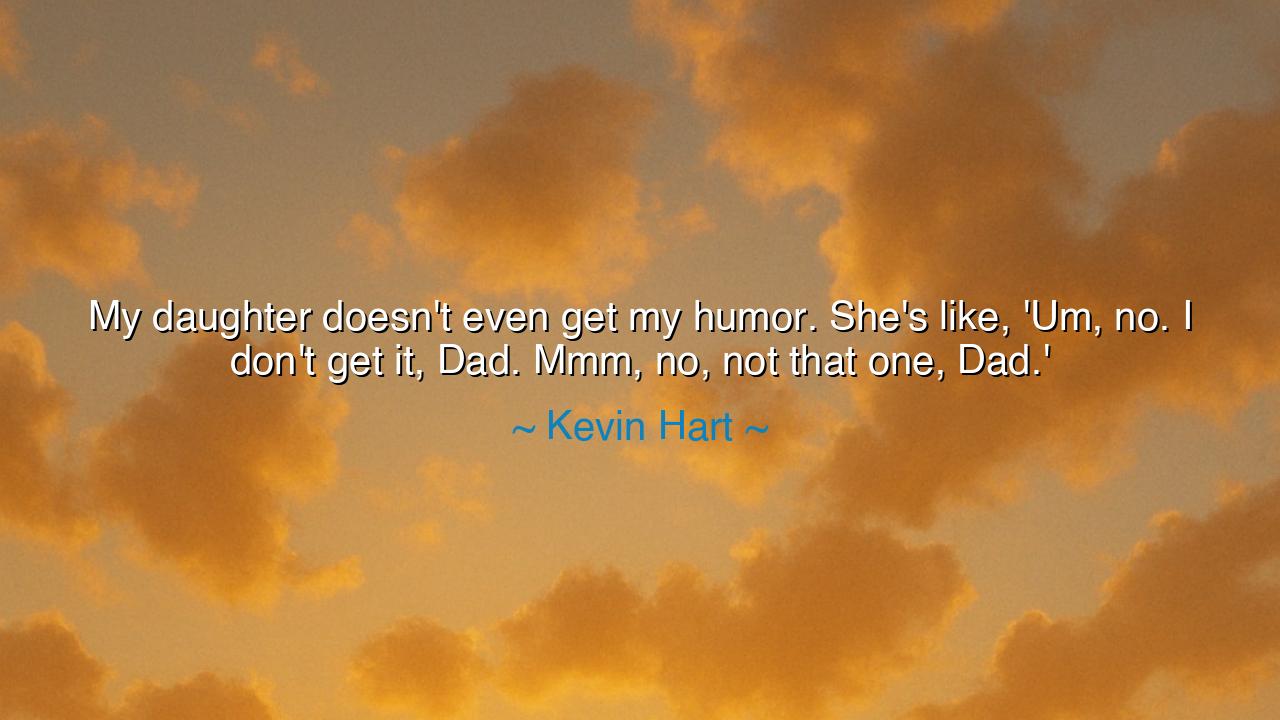
My daughter doesn't even get my humor. She's like, 'Um, no. I
My daughter doesn't even get my humor. She's like, 'Um, no. I don't get it, Dad. Mmm, no, not that one, Dad.'






When Kevin Hart said, “My daughter doesn’t even get my humor. She’s like, ‘Um, no. I don’t get it, Dad. Mmm, no, not that one, Dad,’” he spoke with the laughter of humility — the laughter that comes from love, from the recognition that even the great must bow before the innocence of the next generation. Beneath the surface of this humorous confession lies a deeper truth: that connection between generations is not always born through understanding, but through affection and persistence. Hart, a man who built his empire upon laughter, finds himself in the most human of ironies — that his own child, the one closest to his heart, does not share in the language that made him beloved by millions. Yet in this, there is no bitterness, only wonder.
For what is humor, if not the bridge between hearts? It is the spark that turns awareness into warmth, the invisible thread that binds minds together. But every bridge must be built anew for each soul, for every person carries their own rhythm of laughter, their own shape of joy. Hart’s daughter, growing up in a world different from his, laughs to a different tune. Her “Um, no, Dad,” is not rejection — it is the voice of a generation finding its own way to smile. Through her, Hart learns what all parents learn in time: that the role of a parent is not to have their laughter understood, but to love enough to keep trying, to keep sharing the light even when it flickers differently in the eyes of the young.
The origin of this quote lies in Hart’s real life — a father whose humor has filled arenas, yet who faces the tender humility of family life. It echoes the eternal paradox of the storyteller: that one may make the world laugh, yet find themselves puzzled at home, where love is measured not by applause, but by patience. This paradox has ancient roots. Even Aristophanes, the great comedic playwright of Greece, was said to be bewildered when his own children found his jokes old-fashioned. Yet through that bewilderment, he discovered the beauty of time’s changing music — that each generation crafts its own humor, its own truth, its own laughter.
The difference in humor between parent and child is not a failure — it is the rhythm of renewal. For humor is born of perspective, and perspective is born of experience. The father’s laughter often comes from memory, from wisdom earned through trial. The child’s laughter comes from discovery, from the freshness of the world. These two forms of joy, though different, are not opposed. They are like the sun and moon — separate in light, yet bound in the same sky. Kevin Hart’s story teaches us that love must live between those lights, that understanding is not always necessary when affection remains constant.
Consider, for a moment, the story of Mark Twain, whose sharp wit enchanted the world. Twain once said that his own children found him dull and serious, while the public hailed him as the king of humor. Yet in his journals, Twain wrote with tenderness of those quiet evenings when his children would interrupt his stories with their own jokes, their own strange laughter. He realized then that his humor had shaped them, even if they did not yet see it — that laughter, like wisdom, sometimes takes years to be understood. So it is with Kevin Hart: his daughter’s rejection is not final, but the seed of her own humor, planted by her father’s persistence.
In this way, Hart’s humility becomes his strength. He does not scold, nor demand recognition. He laughs at himself. And this, perhaps, is the highest form of wisdom — to find joy in being misunderstood, to see rejection not as loss, but as proof that the world continues to evolve beyond us. For love is not control; it is the willingness to let others be themselves. Hart’s daughter teaches him, and through him, teaches us all: that laughter, like love, must be given freely, without expectation of return.
So, dear listener, let this lesson take root in your heart: do not cling to being understood — cling instead to the act of sharing. Whether in humor, in wisdom, or in love, give your light without fear that others may not see it the same way. Parents, teachers, leaders — all who pass knowledge forward — must remember that the next generation will laugh differently, think differently, and dream differently. Celebrate that difference, for it is how the world grows.
For in the end, Kevin Hart’s simple moment with his daughter is not a failure of communication, but a triumph of connection. He learns to laugh not at her response, but through it — for her honesty, her independence, her truth. And that is the sacred rhythm of generations: to love deeply enough to laugh together, even when we do not always laugh at the same thing. So, when the world tells you, “I don’t get it,” smile and keep telling your stories. For someday, the laughter will return — changed, evolved, and more beautiful than before.






AAdministratorAdministrator
Welcome, honored guests. Please leave a comment, we will respond soon